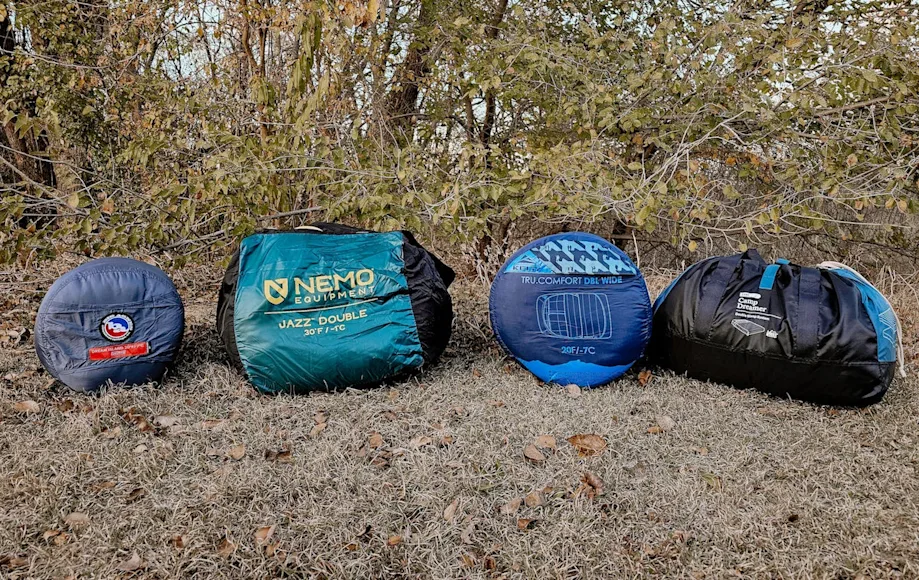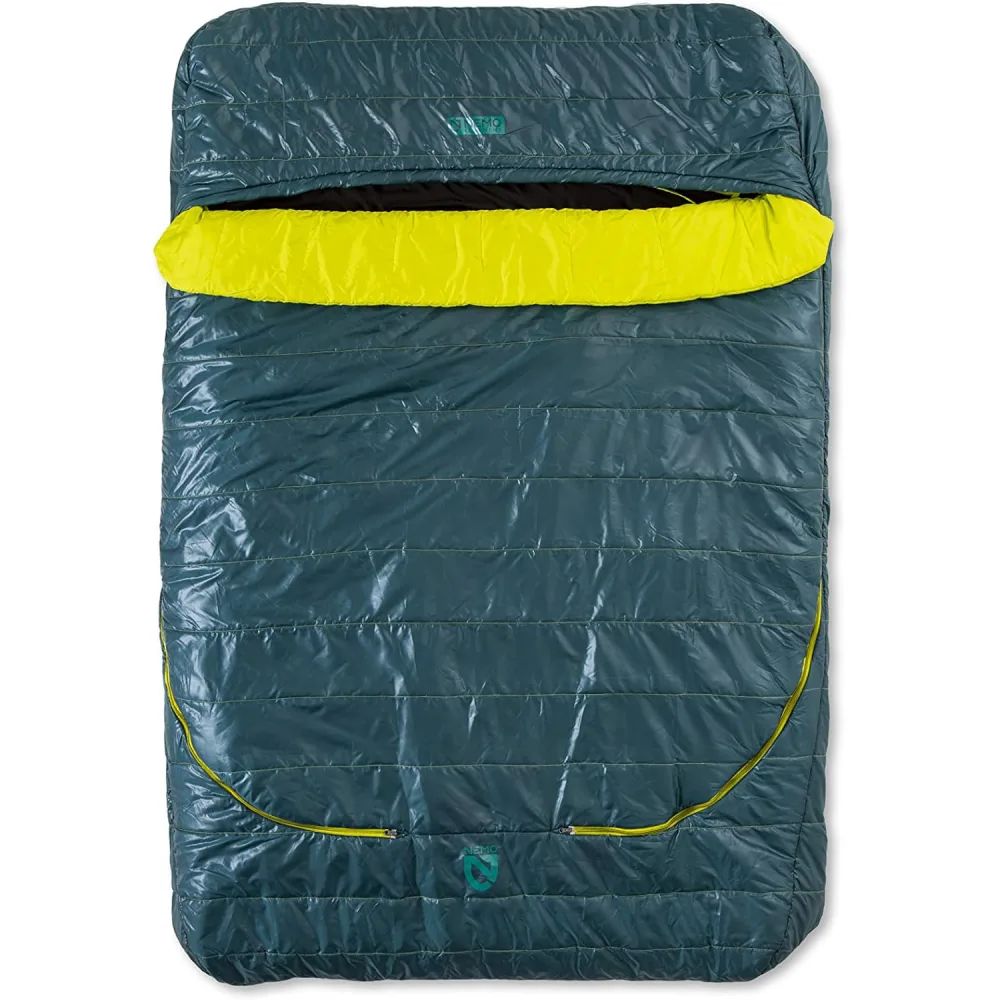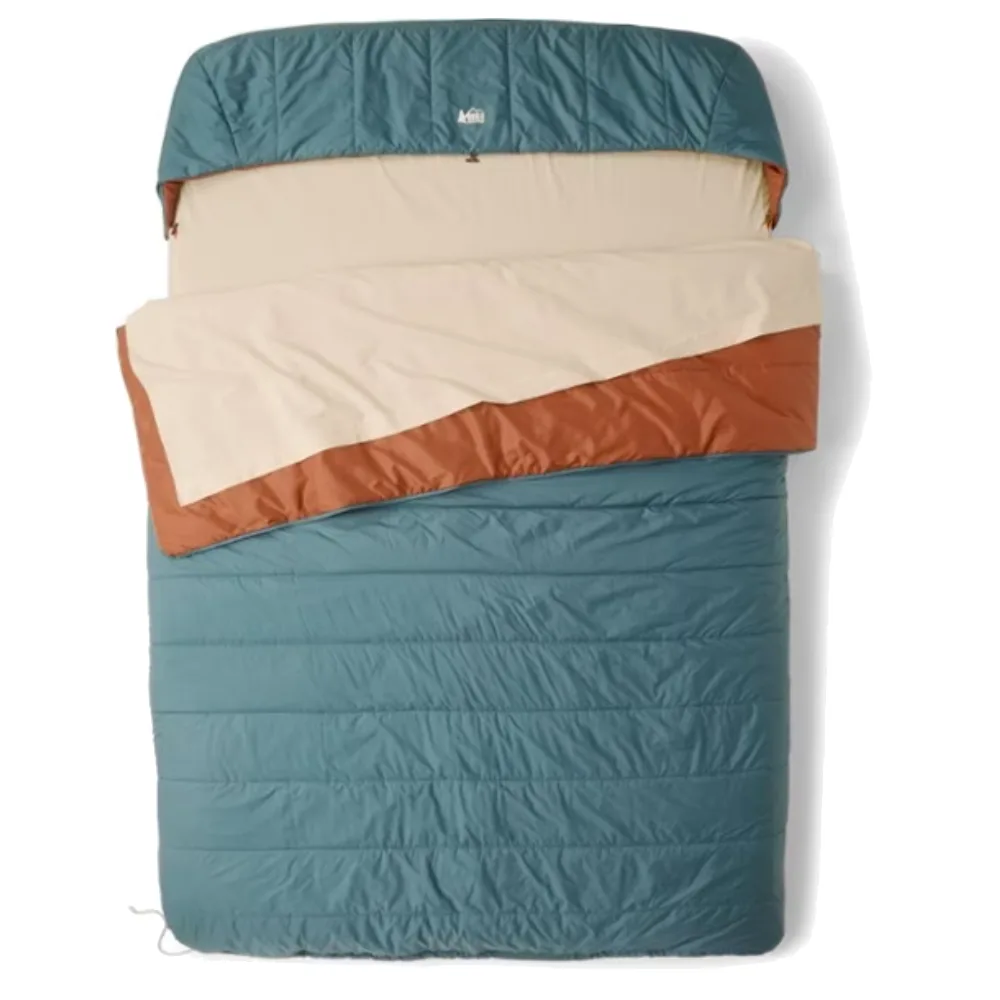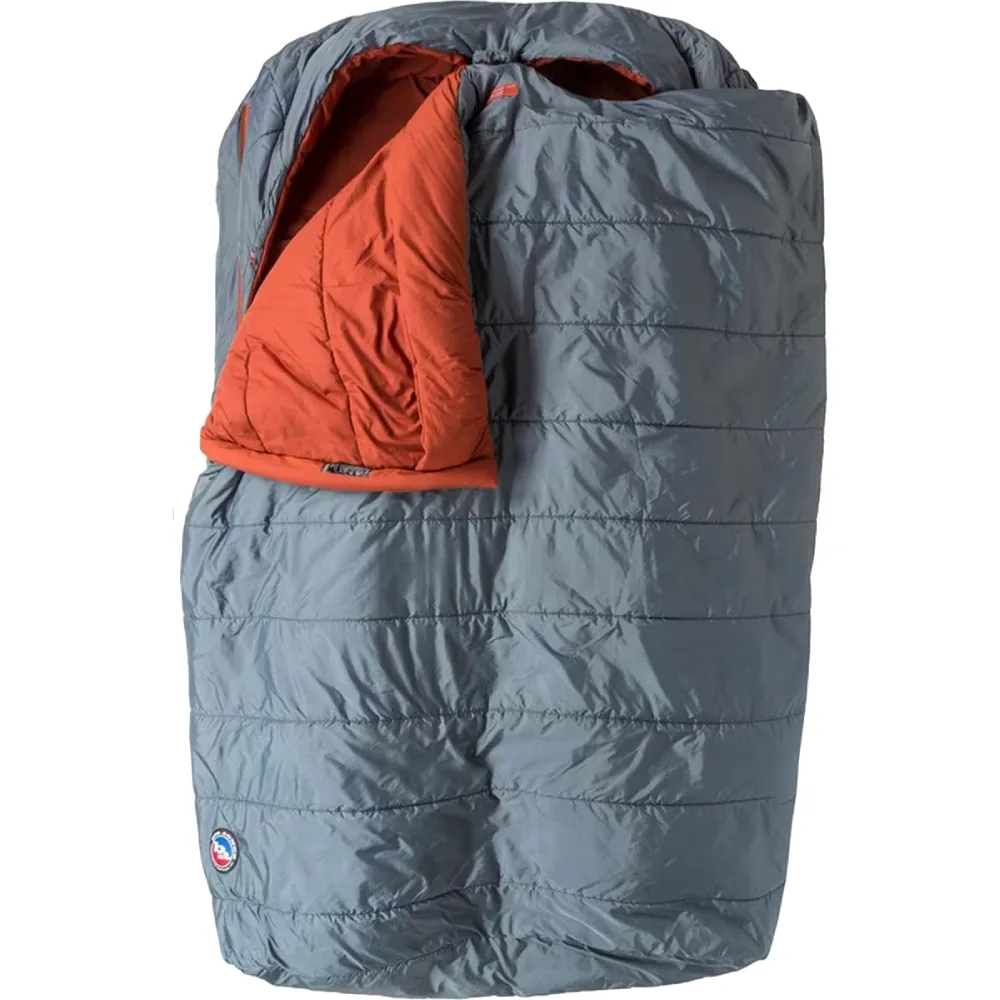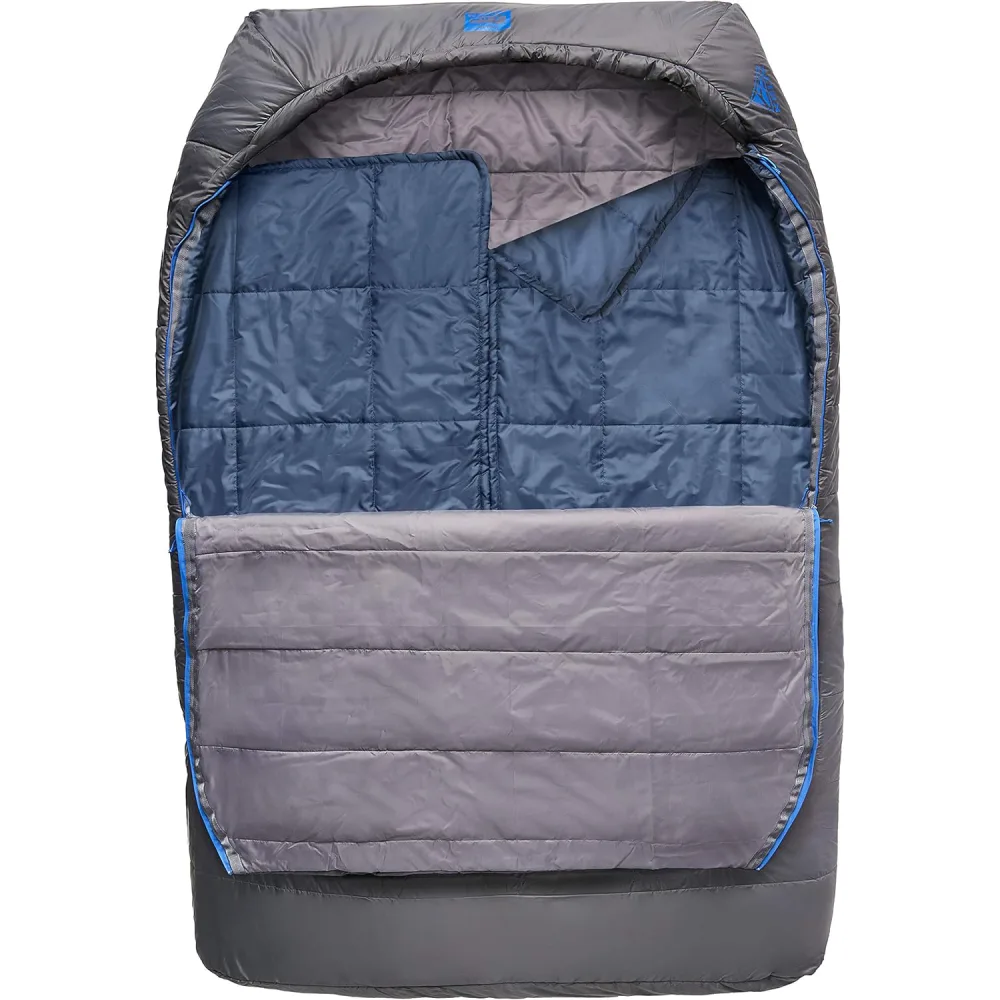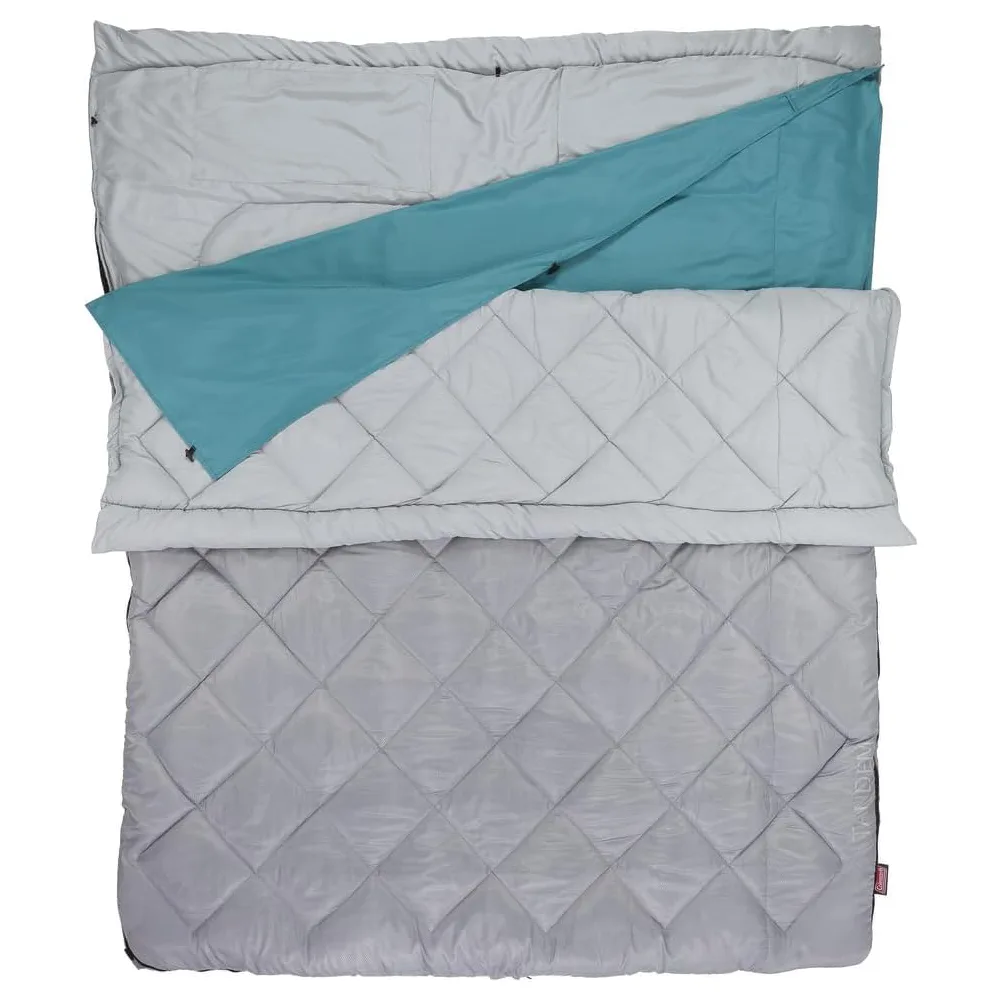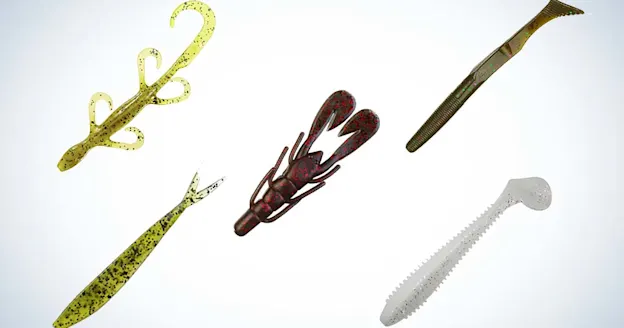We may earn revenue from the products available on this page and participate in affiliate programs. Learn more ›
A bad sleeping system can ruin an entire camping trip. I don’t know about you, but the older I get, the more I prioritize my sleeping setup. While I like my trusty old single sleeping bag, I’m also a big fan of double sleeping bags when I’m camping with my husband. While they’re designed to accommodate two adults, I’ve found double sleeping bags are also great for families with children. And recently, brands have come out with systems that are more compact and portable while not compromising comfort and size.
During my testing and research, I went with the “home away from home” approach, looking for sleeping bags that felt almost as good as my own bed. With the advancement in modern technology for material, insulation, and design construction, the best double sleeping bags below prioritize comfort and temperate accommodation for couples, families, or anyone sharing sleeping spaces.
Best Overall: Nemo Jazz Duo
Best 0-Degree: Teton Sports Mammoth
Best for Backpacking: The North Face Dolomite One
Most Comfortable: Kelty Tru.Comfort Doublewide
Best Lightweight: REI Camp Dreamer
Best Synthetic: Big Agnes Dream Island
Most Comfortable: Kelty Tru.Comfort Doublewide
Best Budget: Coleman Tandem 3-in-1
Best Overall: Nemo Jazz Duo
Specs
Weight: 8 lbs 14.7 oz.
Shape: Rectangle
Fill Materials: Synthetic recycled stratofiber
Temperature Rating: 30 degrees (F)
Pros
Sustainable—made with recycled materials
Pillow pocket keeps your pillow in place
Built-in ultra soft bedsheet
Compatible with the Nemo Roamer sleeping pad
Cons
Bulky, not a bag to pack out in the backcountry
Whoever designed the Nemo Jazz Duo sleeping bag really took the user’s comfort into consideration. When I first pulled out the bag, I immediately noticed several features that set it apart from others I’ve used. To start, it’s very plush—it has the same level of comfort as down, even though it is filled with synthetic recycled stratofiber. Plus, it comes with a soft removable sheet that makes it even more comfy and warm. Features like the draft collar and built-in pillow top provide coziness in the rugged terrain.
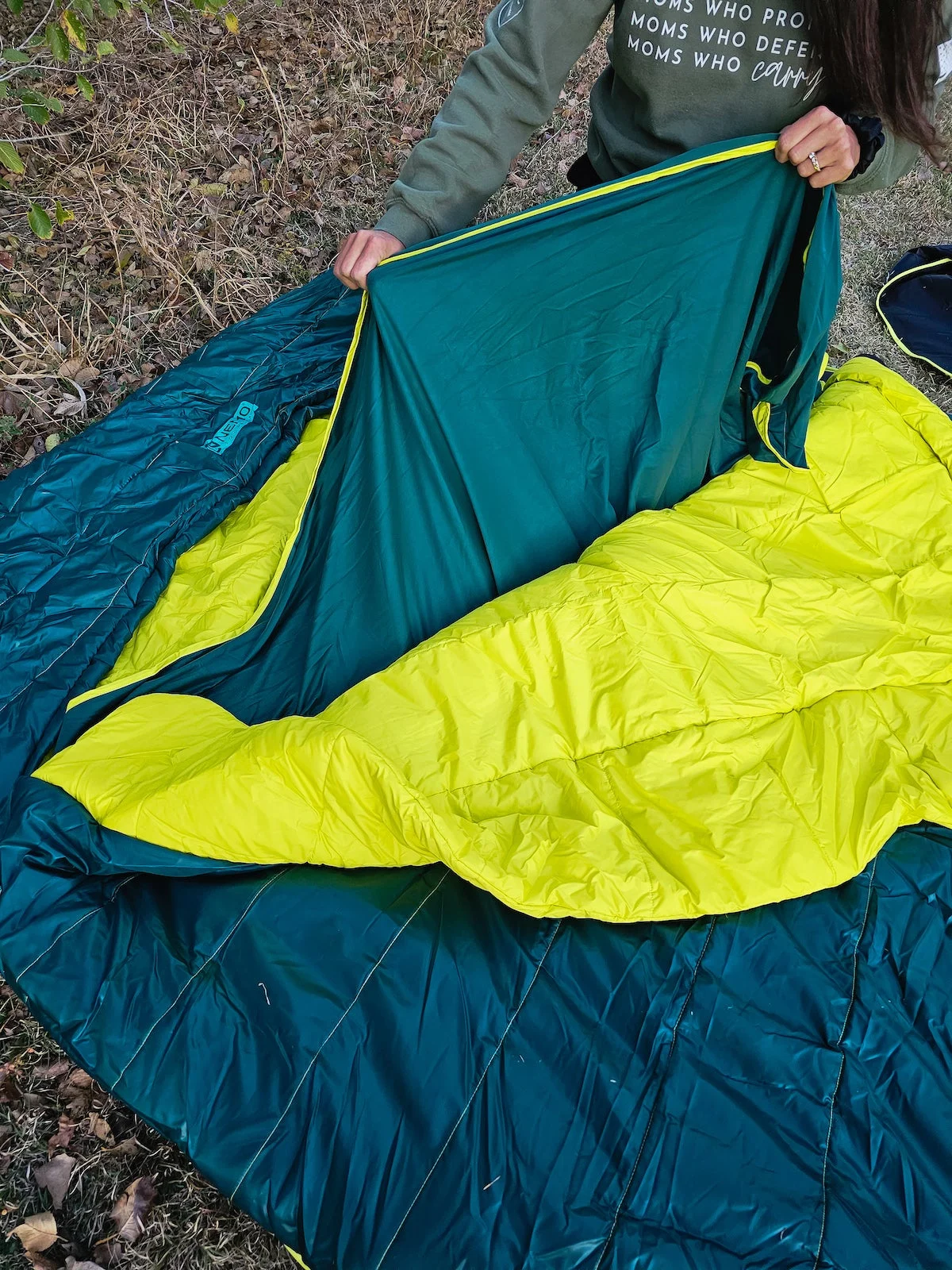
Built to withstand various weather, the temperature rating is 30 degrees(F), featuring a DWR finish that helps shed spills and tent-wall condensation. On the underside, there are pad sleeves that are compatible with two 25-inch pads or one 50-inch pad. I also like that this sleeping bag is a more sustainable option—Nemo uses recycled materials from a climate-neutral certified brand.
Given its size, I was pleasantly surprised by how lightweight the double sleeping bag was. The only complaint I have after using the Jazz is how bulky it was to store and carry. This is not a bag you will be packing out in the backcountry. Fortunately, however, the oversized storage bag allowed for quick packing and did not require me to use excessively tight rolling. It was a fold-and-go process. This bag stood out as my overall pick due to its quality, comfort, and user-friendly features.
Best 0-Degree: Teton Sports Mammoth
Specs
Weight: 16 lbs 5 oz
Shape: Rectangle with mummy-style hood
Fill Materials: SuperLoft Elite Single Channel Hollow Fiber
Temperature Rating: 0 degrees (F)
Pros
Compression sack storage for compact packing
Rated for cold temperatures
Soft-to-the-touch lined with mummy-style hood
Lifetime warranty
Cons
Heavier due to increased insulation
Liner is a separate purchase
Like any good 0-degree sleeping bag worth its weight, the Teton Mammoth is designed to keep you warm during those extra cold winter nights of camping. Constructed with a high quality and sturdy taffeta shell, you won’t have to worry about it ripping or getting damaged—this thing is durable. The bag features a soft-to-the-touch mummy-style hood which helps keep heat from escaping.
The brand’s slogan (“Massive, Mighty, Mammoth”) really suits the oversized sleeping bag. At just over 16 pounds, this Teton sleeping bag is the heaviest one we reviewed, but for good reason. It has a denser insulation for its extreme cold rating. When you are going to endure those low temperatures, you do not want to skip on quality. Another highlight is that you can fully unzip the bag to create two camp side comforters. For easy storage, it has a compression sack to increase its packability.
Bonus: Teton backs their products with a lifetime warranty, giving you peace of mind with your investment.
Best for Backpacking: The North Face Dolomite One
Specs
Weight: 8 lbs 13 oz
Shape: Rectangle
Fill Materials: Synthetic
Temperature Rating: 50 degrees (top layer), 30 degrees (mid layer), 15 degrees (both layers)
Pros
Versatile design for various weather conditions 15 to 50 degrees Fahrenheit
Bottom zippers for ventilation
Warm fleece lining
Comes in both regular and long sizes
Cons
A bit bulkier with multiple layers
The North Face Dolomite One 3-in-1 double sleeping bag is one of the most versatile designs on our list, and a great backpacking sleeping bag. This bag—which comes in both regular and long lengths depending on your size—allows you to remove layers to accommodate the climate. The temperature rating adjusts with each layer, ranging from 15 degrees with both layers combined to 50 degrees with just the top layer. You can also use the removable layers individually as camp blankets around the campsite. I’m a big fan of this as I like products that can serve more than one purpose.
Though this bag can be a bit bulkier to pack due to the multiple layers, it remains modest in weight compared to others offering the same temperature rating. The North Face Dolomite features a fleece lining for added comfort and a bottom zipper ventilation for individual air circulation. Inside, you will find a pocket big enough to hold an iPhone or smartwatch for easy access to your personal belongings.
Despite its weight, I choose this as the best for backpacking because of its versatility for the various weather conditions you can encounter while out in the backcountry.
Best Lightweight: REI Camp Dreamer
Specs
Weight: 7 lbs 3 oz
Shape: Rectangular
Fill Materials: 120 g recycled polyester fibers (Bluesign approved)
Temperature Rating: Has not been given a rating
Pros
4-piece system
Sustainable—contains recycled materials
Detachable hood adds warmth and security while doubling as a headboard and pillow retainer
You can independently adjust the amount of hood coverage
Cons
Not an actual sleeping bag
No temperature rating on the cover
Does not include a compatible camping pad
The REI Camp Dreamer is the ultimate outdoor bedding set. When unpacking this set for the first time, I wasn’t quite sure what to expect—but I was impressed right off the bat. The whole system was very lightweight and felt well-made. While most storage bags are the afterthought of the sleeping bag design, that wasn’t the case with this one. The storage bag was very durable and easy to pack and load.
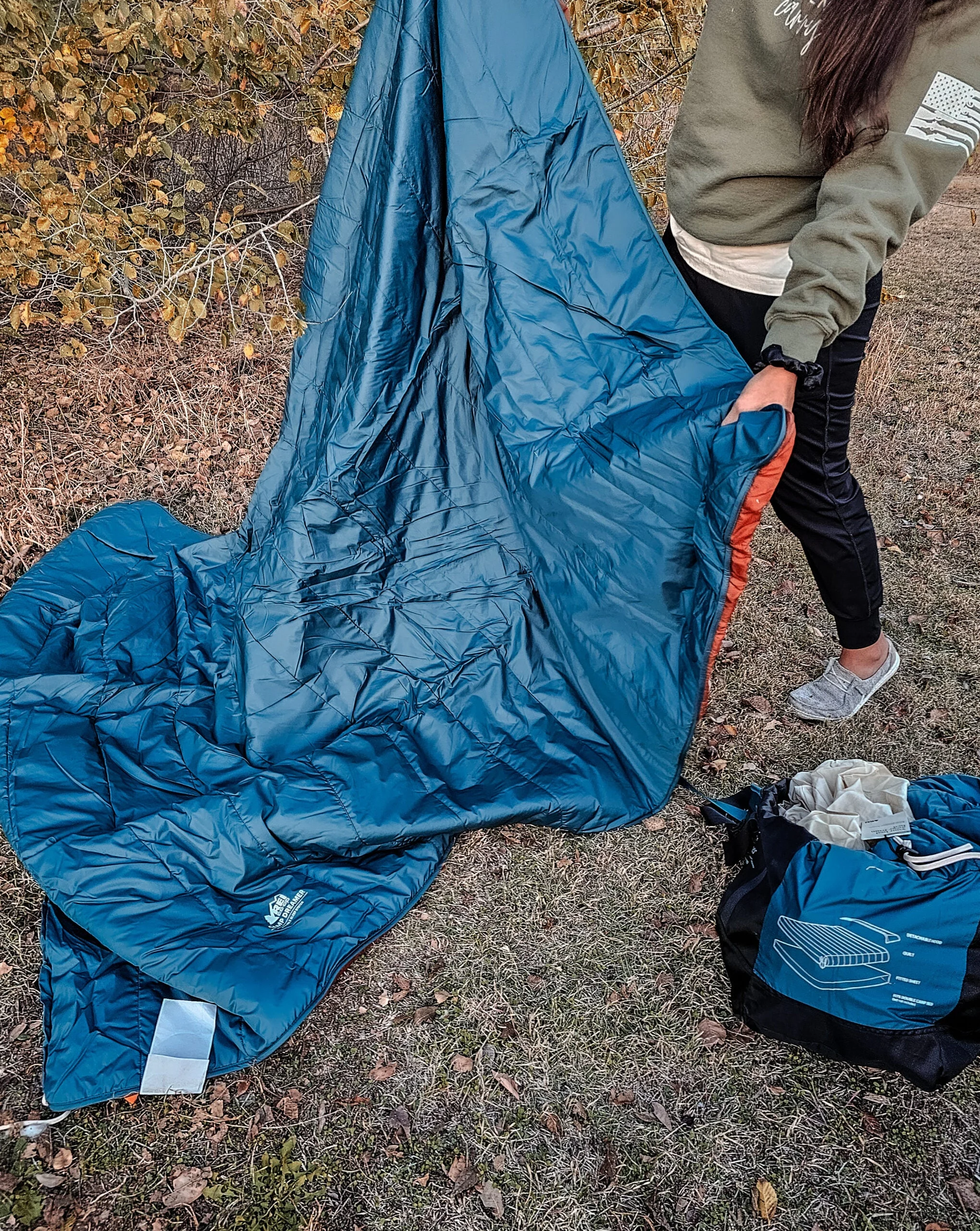
While not technically a double sleeping bag, this sleeping system—which includes a lofty top quilt, cotton top sheet, fitted bottom sheet, and removable hood—is big enough to comfortably sleep two adults. The bottom of the quilt cinches around the pad for a tucked-in fit. But you can also leave it open and use it as a blanket. Add in the adjustable hood and this luxury outdoor comfort set easily becomes a double sleeping bag-like setup.
I actually really liked the REI Camp Dreamer sleeping bag. It takes the comforts of home into the wilderness, making even the most remote camping site feel like a cozy bedroom. The quilt and hood feel like a quality sleeping bag, and the sheets are super soft.
Best Synthetic: Big Agnes Dream Island
Specs
Weight: 7 lbs
Shape: Semi-rectangular
Fill Materials: FireLine Max (synthetic)
Temperature Rating: 20 degrees (F)
Pros
Treated ripstop material for durability and water-resistance
Offset quilt lines eliminate cold spots
Wraparound zipper to use the quilted top as a blanket or solo bag
Streamlined design
Cons
Not as easy to store away in the bag as some of the others on this list
The Big Agnes Dream Island is our top choice if you’re looking for a synthetic sleeping bag. It features treated ripstop material for durability and water resistance, and it weighs just 7 pounds. The semi-rectangular shape and FireLine Max synthetic fill ensure a comfortable night’s sleep even in temperatures as low as 20 degrees. The offset quilt lines effectively help to eliminate cold spots, providing consistent warmth throughout.
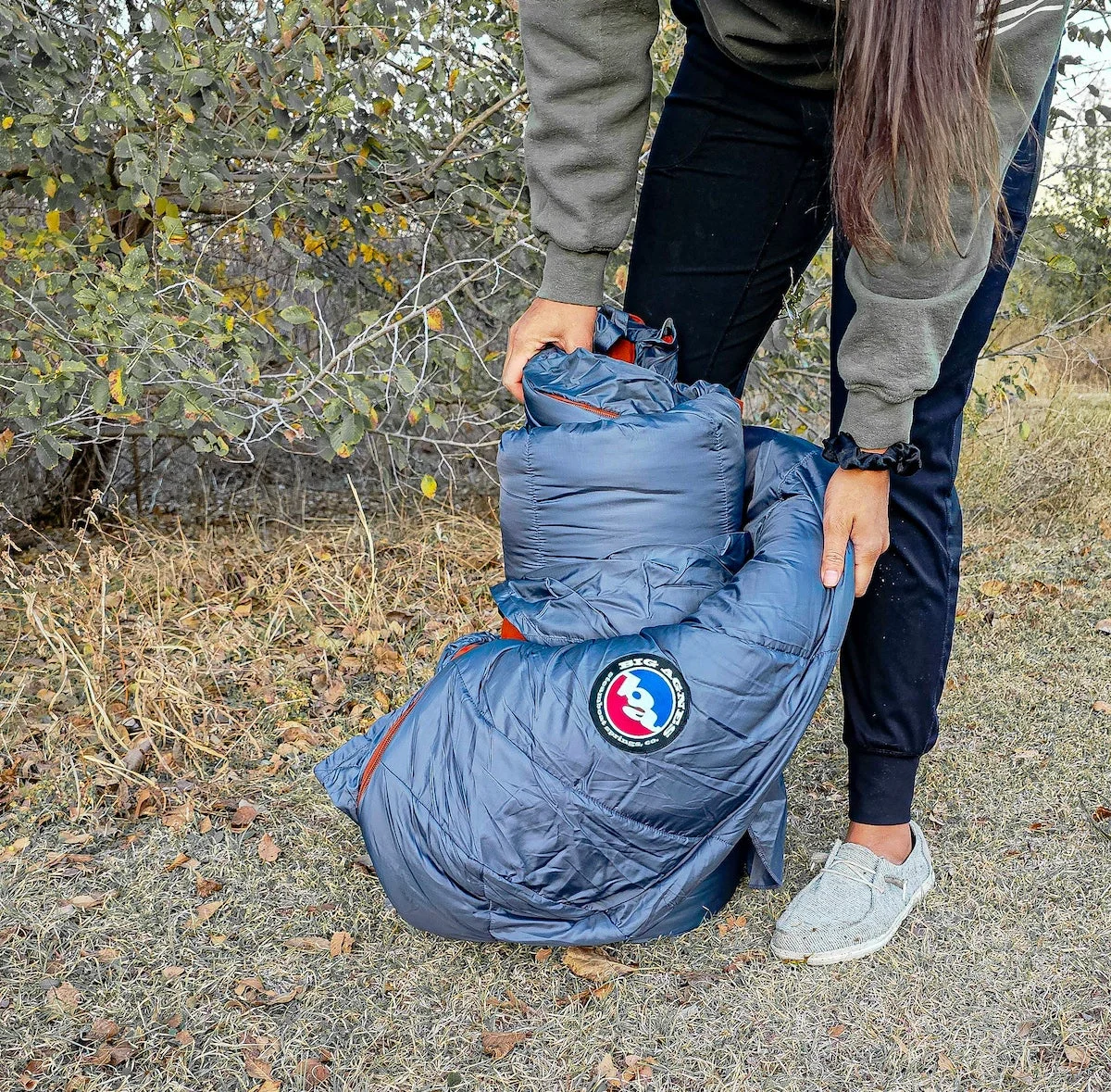
Using the wraparound zipper, I was able to remove the quilted top and use it independently as a blanket or even a solo bag. When zipped up, the quilted top still felt like snuggling with a blanket top from home, and the cinch system prevented me from slipping off my sleeping pad. I like that this bag has a divider to separate the two sleepers. This is perfect for non-couples or even kids sharing a sleeping space.
With an accommodating 6-foot-6 max user height, it caters well to taller individuals. Despite its warmth and features, it was more challenging to roll and stuff away than some of the others I tested, perhaps because of its longer length. Overall, however, the Big Agnes Dream Island’s blend of durability and adaptability makes it a solid choice for users seeking reliable comfort performance in a synthetic double sleeping bag.
Most Comfortable: Kelty Tru.Comfort Doublewide
Specs
Weight: 9 lbs 8 oz
Shape: Semi-rectangular
Fill Materials: Cloudloft Synthetic
Temperature Rating: 20 degrees (F)
Pros
Two-foot vents and patented built-in blankets
Environmental and health-friendly PFC-Free DWR fabric
Stuff sack included
Affordable
Cons
Slightly heavier than most of the bags we tested
I have tested other Kelty products, and I am always satisfied with the exceptional quality. When I took this bag out of the stuff sack, I immediately noticed the heavy-duty construction, and the ease of using the zipper. I did not encounter any snags—I even had one of my young sons helping me and he used the zipper without any issue. This bag was designed to last years of rugged use.
Weighing in at a manageable 9 pounds and 8 ounces, the Kelty Tru.Comfort Doublewide features a semi-rectangular shape that offers plenty of room for a comfortable night’s rest. Filled with Cloudloft Synthetic, it has a temperature rating of 20 degrees. Some of my favorite features during testing—and what set it apart from others—were the two foot vents, which enhanced airflow, and the patented built-in blankets. There’s no need to pack additional blankets; each sleeper has their own blanket panel. I also appreciated the zip-off top layer for those warmer nights.
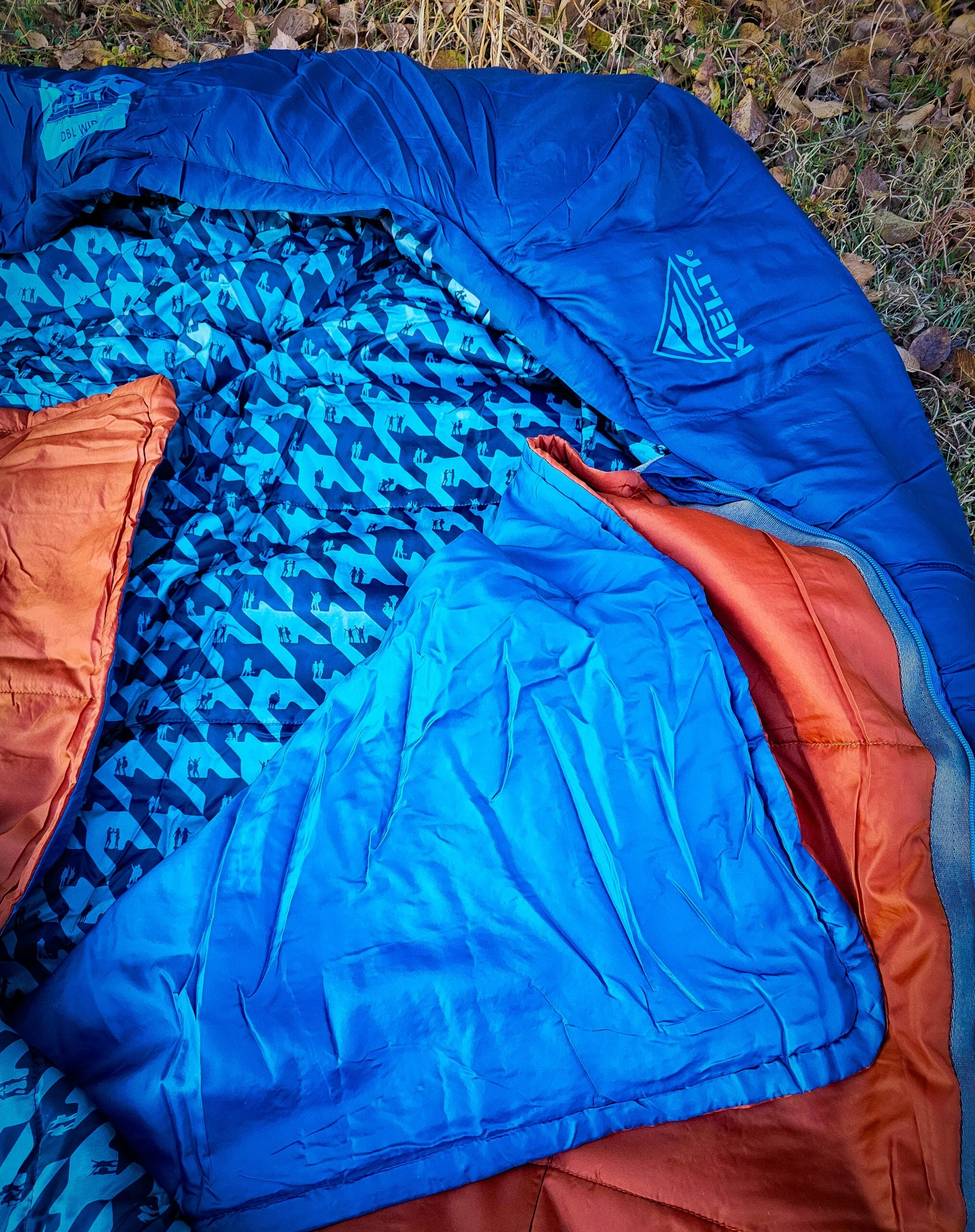
Additionally, the PFC-free DWR fabric reflects Kelty’s commitment to eco-friendliness while also keeping you dry in wet weather conditions. At its affordable price point, this sleeping bag is the perfect balance of functionality and value. One note: This bag seemed denser than the others I used, making it feel heavier even though the weight difference was minimal.
Best Budget: Coleman Tandem 3-in-1
Specs
Weight: 9 lbs 5 oz
Shape: Rectangle
Fill Materials: Polyester
Temperature Rating: 45 degrees(F)
Pros
3-in-1 design allows you to convert it into two separate sleeping bags
Snag-free ZipPlow zipper
Accommodates taller people
Cons
Not as plush and robust as others we tested
It is undeniable that Coleman continues to produce quality gear at affordable pricing—and the Tandem 3-in-1 is proof of that. This budget-friendly double sleeping bag is rated for 45 degrees (F) with a polyester fill material, providing a good three seasons of use. Though it is not as plush and robust as some of the others we tested, it will still get the job done. The snag-free ZipPlow zipper prevents accidental rips and tears, preserving the life of your sleeping system. The generous length accommodates campers up to 6-foot-4 in height. Additionally, this bag features a 3-in-1 design that can be converted into two separate sleeping bags or campsite blankets.
How We Tested Double Sleeping Bags
Choosing the right double sleeping bag depends on the type of camping trips you plan on taking and your personal preferences. There are a lot of options out there, so knowing what you need before you narrow down your choices is necessary. Below are some of the criteria we considered in making our list prior to testing.
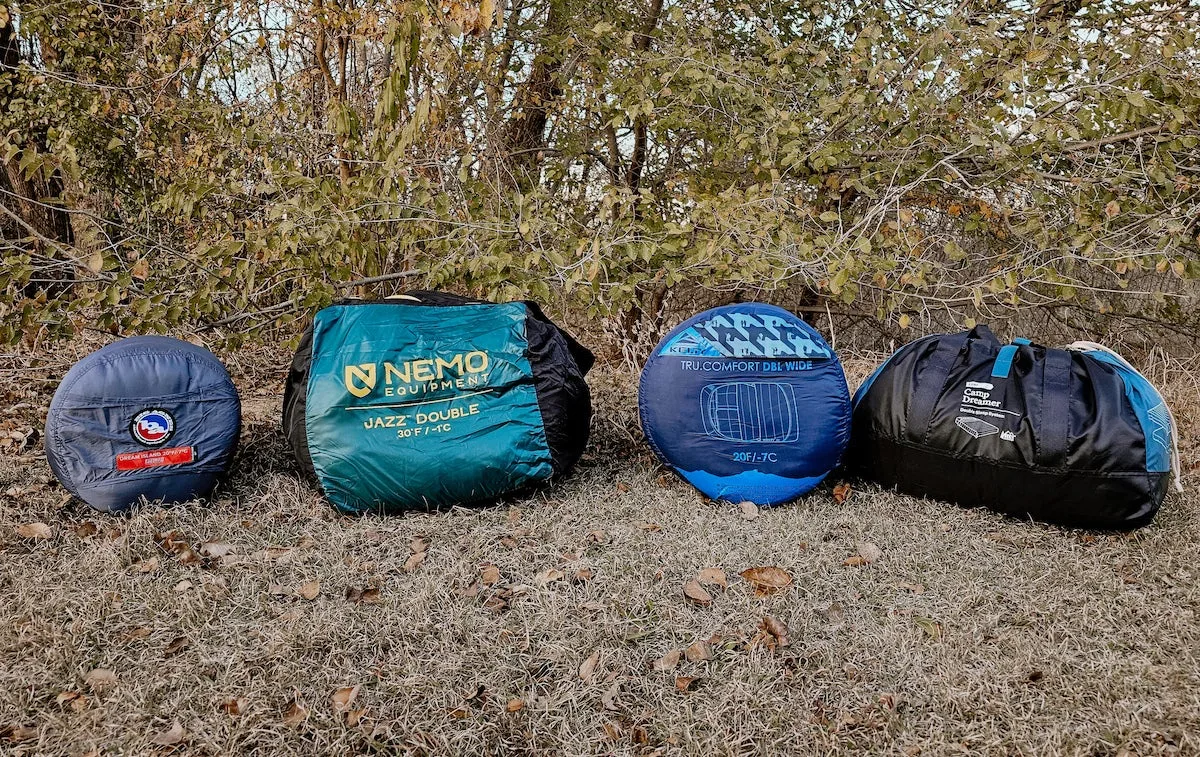
Season and Insulation: Consider the season(s) when you’ll be using your bag. There’s nothing worse than waking up sweating in your winter sleeping bag in the middle of summer. Many bags allow for multiple seasons of use and have added features to accommodate the temperature change and possible water exposure.
Price: Most double sleeping bags are going to come in at a higher price than your standard one-person bag. Before you begin shopping around, settle on a budget.
Size and Weight: Sometimes it seems like you are packing the whole house when you’re gearing up for a camping trip. Consider if the weight of the double sleeping bag will affect loading, storing or transportation—especially if you’re backpacking.
What to Look for in a Double Sleeping Bag
Materials and Insulation
Consider durable materials that withstand regular use and various weather conditions, like water-resistant DWR or waterproof exteriors. You’ll also want to look for the correct temperature rating. You don’t want a cold weather bag with no adjustability for the summer camping months. A lot of this comes down to personal comfort preferences. There are several different fill and shell materials. Synthetics, for instance, trap heat even when wet compared to down fill options.
Packability and Storage
Double sleeping bags are not the best options for long packing trips. They are large and oversized and weigh significantly more than your standard sleeping bag. If you plan on carrying the sleeping bag for camping or hiking, consider its weight and pack size. Lightweight and compression options are preferable for easy transport and storage.
Additionally, when I was testing, I noticed the packing up time took much longer than with a standard bag and some even required the assistance of another person.
Size and Shape
Ensure the sleeping bag comfortably accommodates two people. There are bag lengths that have generous height allowances. Look for a design that provides enough room for both occupants to move and turn comfortably during sleep. Rectangular or semi-rectangular shapes often offer more space than mummy-shaped bags.
Sleeping Pads
Gone are the days of sleeping directly on the ground. Most bags have compatible sleeping pads. If you are considering using a sleeping pad with your bag, it may be beneficial to research a pad that suits your comfort preferences. Most double sleeping bags allow for two single pads or one large doublewide pad. Single pads allow individuals to pick pads according to their liking. Double-sized pads allow for less gear to pack around and less shifting once the sleeping bag is in place.
FAQs
Q: How many years does a sleeping bag last?
Many factors—like the material, insulation, and usage—go into determining the lifespan of a sleeping bag. Typically sleeping bags can last for 4 to 15 years. However, a quality sleeping bag with minimal use could remain usable for up to 20 or 30 years.
Q: Why are sleeping bags are warmer than blankets?
The enclosed space of a sleeping bag helps to trap in body heat while the insulated material slows the escape of that heat. This often creates a warmer environment than a loose blanket.
Q: What is the coldest temperature for a sleeping bag?
The cold rating depends on the insulation type. There are bags made for different seasons. If you are in search of a cold weather sleeping bag for extreme temperatures, a winter bag or low temperature bag can tolerate -20 to -40 degrees Fahrenheit.
Final Thoughts
The best double sleeping bags provide a spacious and cozy setup for anyone who prefers shared sleeping arrangements while camping. Despite the potential bulkiness and weight, a double sleeping bag offers plenty of room for two people, providing ample warmth and comfort during overnight camping trips. We highly recommend the Nemo Jazz Duo for its soft material and thoughtful features.
Why Trust Us
For more than 125 years, Field & Stream has been providing readers with honest and authentic coverage of outdoor gear. Our writers and editors eat, sleep, and breathe the outdoors, and that passion comes through in our product reviews. You can count on F&S to keep you up to date on the best new gear. And when we write about a product—whether it’s a bass lure or a backpack—we cover the good and the bad, so you know exactly what to expect before you decide to make a purchase.

